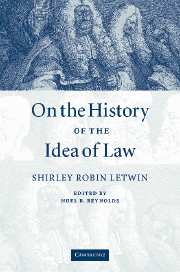Book contents
- Frontmatter
- Contents
- Editor's preface
- Introduction: The idea of law
- Part I Law anchored to a cosmic order
- Part II The Christian revision
- Part III The modern quest
- Part IV The significance of rules
- Part V The idea of law repudiated
- 12 Marxist theories
- 13 Political jurisprudence I: From Realism to feminist jurisprudence
- 14 Political jurisprudence II: Ronald Dworkin
- Part VI New foundations
- Index
12 - Marxist theories
Published online by Cambridge University Press: 22 September 2009
- Frontmatter
- Contents
- Editor's preface
- Introduction: The idea of law
- Part I Law anchored to a cosmic order
- Part II The Christian revision
- Part III The modern quest
- Part IV The significance of rules
- Part V The idea of law repudiated
- 12 Marxist theories
- 13 Political jurisprudence I: From Realism to feminist jurisprudence
- 14 Political jurisprudence II: Ronald Dworkin
- Part VI New foundations
- Index
Summary
Although the lengthy history of law's study has produced many different questions and many different answers, until the nineteenth century there was agreement on two points: First, that law is a way of ordering communal relations that must be chosen and can be rejected by those subject to it; and second, that law is superior to other forms of regulation. Both points have been denied by Marxist writers on law.
Just how the Marxist view influenced subsequent developments in the philosophy of law is not immediately obvious. Echoes and intimations of Marxist ideas appear in later writers. But whether they were directly derived from Marx remains to be established. The Realists, who contributed to the repudiation of the idea of law, do not explicitly draw on Marx and were not known to be Marxists. Direct acknowledgments to Marxism in the philosophy of law became noticeable only after mid-twentieth century, in Critical Legalism and Feminist Jurisprudence. But however Marxism affected attitudes towards law, it is an important part of this history because it so clearly highlights the postulates of the idea of law that have been definitely rejected by others subsequently.
The rejection of law rests on the Marxist definition of man as a “species-being.” When Marx said that man is a “species-being,” he meant that individual human beings are manifestations of the human species in the same way as leaves are manifestations of the life of the tree on which they hang.
- Type
- Chapter
- Information
- On the History of the Idea of Law , pp. 221 - 246Publisher: Cambridge University PressPrint publication year: 2005



